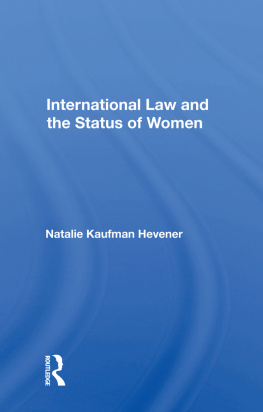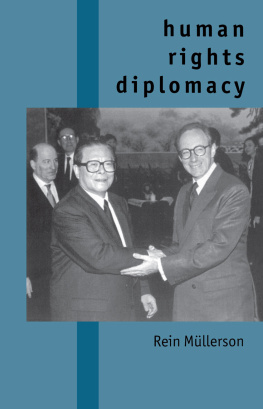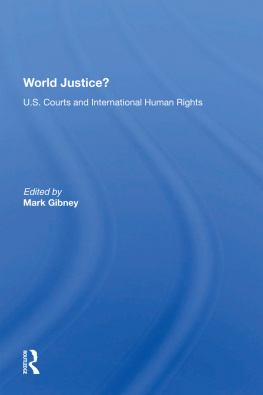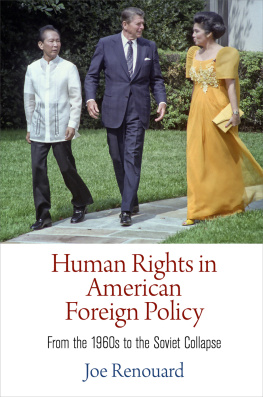The Dynamics of Human Rights in U.S. Foreign Policy
The Dynamics of Human Rights in U.S. Foreign Policy
Edited by
Natalie Kaufman Hevener
First published 1981 by Transaction Publishers
Published 2017 by Routledge
2 Park Square, Milton Park, Abingdon, Oxon 0X14 4RN
711 Third Avenue, New York, NY 10017, USA
Routledge is an imprint of the Taylor & Francis Group, an informa business
Copyright 1981 by Taylor & Francis
All rights reserved. No part of this book may be reprinted or reproduced or utilised in any form or by any electronic, mechanical, or other means, now known or hereafter invented, including photocopying and recording, or in any information storage or retrieval system, without permission in writing from the publishers.
Notice:
Product or corporate names may be trademarks or registered trademarks, and are used only for identification and explanation without intent to infringe.
Library of Congress Catalog Number: 79-66435
Library of Congress Cataloging in Publication Data
Main entry under title:
Human rights in United States foreign policy.
Includes index.
1. Civil rights Addresses, essays, lectures.
2. United States Foreign relations 1977 Addresses, essays, lectures.
3. Civil rights United States Addresses, essays, lectures. I. Hevener, Natalie Kaufman.
K3240.6.U54 341.48 1 7966435
ISBN 0-87855-347-9
ISBN 13: 978-0-87855-956-5 (pbk)
TO CARROLLEE And All Our Children
Contents
Paul M. Kattenburg
Richard A. Falk
Robert L. Borosage
Louis B. Sohn
Bruno V. Bitker
Walker F. Connor
Peter Weiss
Marcus G. Raskin and Ann Wilcox
Robert G. Wirsing
C. Clyde Ferguson
Martin Weinstein
David Weissbrodt
Robert B. Boettcher
Richard B. Lillich
This volume grew out of a colloquia series held in the Department of Government and International Studies of the University of South Carolina. The series was made possible through grants from the United States Department of State, Bureau of External Research, the University's Faculty and Productive Scholarship Fund, and the Office of the Dean of the University's College of Humanities and Social Sciences. I am grateful for this financial support which enabled me to bring a number of outstanding scholars and practitioners to the campus to discuss their work on human rights. I owe a special debt to authors Richard Falk, Louis Sohn, Robert Borosage, Peter Weiss, and Robert Boettcher for taking the time to come to South Carolina and for sharing their ideas and experience with us; I am also grateful to the faculty and graduate student participants from the department whose informed, provocative, and constructive comments were invaluable to the editor and to the visiting contributors. To Dean Chester Bain, and the department chairmen, James Holland and James Kuhlman, I wish to express my thanks for their help and support during the colloquia series.
My task of transforming the colloquia papers into a finished volume was greatly aided by the extensive review, suggested revisions, and persistent optimism of Robert G. Wirsing and Paul M. Kattenburg. Also my two graduate assistants, Steven Mosher and Carl Young, worked well beyond their normal hours diligently and cheerfully helping me with the entire process of manuscript preparation.
Finally, I wish to thank my family, especially Suzy and Sam, and my friends, William P. Kreml, Carolyn Matalene, William Matalene, and Mary Bryan for our many enlightening and enjoyable discussions and for their abiding confidence in me and my work.
In recent years human rights has become one of the most used phrases in the American political lexicon. Its popularitynot only in the United States but also abroadhad been increasingly visible throughout the 1970s. But the turnover in Washington in 1976 from Republican to Democratic administrations gave it vastly more official sponsorship and undoubtedly quickened the tempo of its public acceptance.
In sharp contrast to its Republican predecessors, the Carter administration advanced human rights as an explicit and prominent part of its announced foreign policy agenda. Largely unanticipated, and by no means fully understood or approved, this unusually emphatic endorsement of human rights has been given a great many explanations. Among the most commonly cited are:
Earlier congressional human rights initiatives, including a series of hearings, resulted in structural and policy action which the Carter administration inherited. Congressional committees and a Department of State bureaucratic division on human rights were already established.
Public disillusionment with the Nixon-Watergate revelations and, to a lesser extent, Kissinger's ultrarealistic foreign policy set the stage for dramatic change. The new avowedly moral policy distinctly separated Carter from the previous administration in a particularly effective fashion: the policy was claimed to be moral in content and implementation.
United States world leadership had been damaged by the defeat in Vietnam. Through the human rights policy, the Carter administration was able to draw on a domestically acceptable source for reviving American stature in international affairs: the American tradition reflected in the Declaration of Independence and the Bill of Rights.
A further response to Vietnam, as well as to United States economic difficulties, was a domestic tendency toward isolationism. The human rights emphasis provided a rationale for the revival of an activist, if not interventionist, foreign policy.
Carter, himself, as an apparently deeply religious man appears to have personally charted his human rights policy in the hope of creating a new sense of national integrity to parallel the personal integrity so much a part of his public as well as personal image.
International organizations, both public and private, have significantly increased their discussion of and action on human rights, particularly in light of intensified concern over racist policies in Africa. The Carter administration may have felt the need to respond favorably to this rather strong international pressure.
The response to Carter's concentration on human rights, however, may appear to the interested observer to have created a hodgepodge of contradictory forces: accusations and defenses; revelations and concealments; sincere investigations and manipulative inquiries; legitimate concern and pious posturing; cynical resignation and naive optimism. One might conclude that the energy expended on this subject has produced more confusion than clarification, more harm than help. There are some who are already convinced that the human rights issue suffers from overexposure. They would be relieved, no doubt, to see the fading from public attention of this intensely complex, highly controversial, and personally disturbing subject. Their uneasiness is well-founded: a full, open national debate on human rights has the potential of revealing fundamental disparities between stated nationally shared values and their contemporary level of implementation.
Concern with human rights will continue to be a major characteristic of domestic and global politics and will, therefore, have a significant impact on the formulation, implementation, and evaluation of United States foreign policy. The contributors to this volume have felt from the beginning that the discussion of this subject although difficult and hazardous was worth pursuing. In addition, they agreed to the necessity of placing the debate in an international context aware that this added dimension would compound the problems already existent at the national level.












